334: Inside COP: Storms in Belém - Lula’s arrival, the carbon tariff debate, and the COP31 decision
We trace the twists of the Australia-Turkey negotiations for hosting COP31 in real time and dive into one of the summit’s biggest sticking points: CBAM, the Carbon Border Adjustment Mechanism.
About this episode
We’re approaching crunch time in Belém, and a long-running COP30 saga may finally have found its landing spot. After days of rumour, diplomacy and thunderous rainforest downpours, the question of who will host COP31 looks close to being resolved - and it all plays out over the course of our day’s recording.
Paul Dickinson and Fiona McRaith trace the twists of the Australia-Turkey negotiations in real time, with insight from former UN diplomat Dean Bialek. Plus, we hear from political journalist Thais Bilenky on the domestic pressures shaping Lula’s approach, as the Brazilian president personally steps in to break the deadlock.
Across the day, the team also dives into one of the summit’s biggest sticking points: CBAM, the Carbon Border Adjustment Mechanism. In a wide-ranging conversation, the EU’s Teresa Ribera lays out why Brussels sees CBAM as essential for true decarbonisation - but why it’s sparking concern among countries who fear they’ll be penalised while still industrialising.
Then it’s over to the Action Agenda, with Dan Ioschpe and Jennie Dodson giving a ground-level view of how coalitions, companies and cities are reshaping the COP’s centre of gravity - from regenerative landscapes in Brazil to global momentum across grids, food systems and industry.
Finally, as we’re packing up the mics, news of COP31 appears to land. What does this unusual arrangement mean? What happens to the long-promised Pacific Island leadership? And what will it take for next year’s COP to deliver on the ambition so many hoped this decision would unlock?
Learn more:
📣 Read the latest reports about the COP31 host and Presidency
⚙️ Dive into the nuts and bolts of the EU’s CBAM
🧩 Explore the 6 pillars and 30 objectives of the COP30 Action Agenda
🌍 Check out the official COP30 website for background and announcements
🎤 What do you want to hear on Inside COP? Ask us on SpeakPipe or on our socials where you can also see more behind the scenes moments and to watch our videos:
Instagram @outrageoptimism
LinkedIn @outrageoptimism
Or via this form.
Lead Producer: Ben Weaver-Hincks
Planning Producer: Caitlin Hanrahan
Edited by: Miles Martignoni
Exec Producer: Ellie Clifford
With thanks to Groundswell and Global Optimism.
This is a Persephonica production for Global Optimism and is part of the Acast Creator Network.
Full Transcript
Transcript generated by AI. While we aim for accuracy, errors may still occur. Please refer to the episode’s audio for the definitive version
Fiona McRaith: [00:00:00] Hello everyone, it's Fiona and I am walking out of the blue zone right now after spending the day trying to trace a story that has probably now been formally announced, but as of recording this, it has not yet. And that is who is hosting and who is the presidency of Cop 31 next year. We think we know the answer as I'm walking out of the halls, but we've followed the story today, getting sources that we don't bring on the pod and one really knowledgeable source that we do. And you'll come along that journey with us in this episode. We hope you enjoy it.Paul Dickinson: [00:00:36] Hello and welcome to Inside Cop from Outrage and Optimism. I'm Paul Dickinson.
Fiona McRaith: [00:00:40] And I'm Fiona McRraith.
Paul Dickinson: [00:00:42] Today, the latest drama from the Blue Zone, a spotlight on the action agenda and deep dive into the contentious question of sebum, the carbon border adjustment mechanism. Thanks for being here.
Fiona McRaith: [00:00:58] So big day of drama here at Cop 30. And the skies also join in the fun. Thunderstorms. We are in the rain forest. We're in BLM and roof leaks in the blue zone. Specifically right above where I was literally sitting.
Paul Dickinson: [00:01:17] Just listening to that, I got to tell you, I was in the action agenda and we'll talk about it later. But there were three countries France, Sweden, Australia literally drowned out. No one could hear anyone speaking because the volume of the rain was so intense. It's science fiction. Rain. Amazing. Never experienced it before.
Fiona McRaith: [00:01:33] So that being said, the afternoon was pretty loud, pretty thundery, and in a delightful way, reminding us where we are in the world. The Amazon rainforest, one of the global tipping points, as Christiana mentioned a few times last week, but we haven't mentioned in an episode in about 48 hours. So here it is again. The weather today. Paul, as you know, was not the only thing that got people talking. The question of which country hosts Cop 31 was definitely still kind of ping ponging around the halls. And as a reminder, it's the Western Europe and Others group or the Weog. It's their Turn Next acronym. I think that's what some of our insiders call it. And I love it. The Weog. I hope that's right. And there are two countries vying for the presidency Australia and Turkey. The first lady of Turkey was apparently deeply invested, as we reported last week, and we heard last week as well that it may be possible that they're going to split it, do a leader segment in one, and then the cop in the other. But actually, the news broke yesterday that Australia would, quote, not veto Turkey's attempt. But what did this mean in practice? It got tongues wagging, that's for sure. And a lot of people actually say that that was a tactic of Australia's to try to get this issue moving again. We caught up with a friend of the show, Dean Bialek, former UN diplomat, and he's worked with Marshall Islands.
Paul Dickinson: [00:02:58] Yeah, he's super smart and I think sort of lives and breathes Australia in the region and what's best. So let's see what he's got to say.
Fiona McRaith: [00:03:06] So we're in the Western Europe and others group of the UN and it's between Turkey and Australia. It's been dragging on for I mean Australia submitted their bid three years ago. But we need to know by the end of this cop where it's going. And it's either going to be in Bonn, in Germany, Australia or in Turkey. But today there was some news. And what was that news? Can you tell us a little bit about it?
Dean Bialek: [00:03:27] Well, it's been building up for quite some time. I should say that the kind of interaction between the two competing delegations was very, very intensive, actually in the margins of UN General Assembly Week in, in September. And there's been ongoing negotiations at all levels of government. So correspondence between the two heads of state.
Fiona McRaith: [00:03:49] The first lady got involved on Turkey's side.
Dean Bialek: [00:03:51] Correct. Uh, foreign ministers have been talking, but really in the lead of the Australian effort and the Turkish effort have been ministers Bowen and Karam, both climate ministers of their respective countries. They arrived on Sunday and Monday respectively, and so there's been quite intensive interactions between them over the last 48 hours. There's some kind of formal proposals that were put on the table very early this morning, and I think some pressure from the Brazilian presidency to try and resolve this issue so everyone can just get on with preparations for next year.
Fiona McRaith: [00:04:26] What is it uniquely that you think Australia and the Pacific Islands could bring as hosts of the car?
Dean Bialek: [00:04:31] There's a few things. One, I should say that here we're just south of the equator by only a few millimeters. But essentially, other than here, there has been no cop in the southern hemisphere since Lima in 2014. So everyone that works here knows that one of the fundamental principles of the UN system is equitable geographic distribution or representation. And really, we're starting to get into a situation where the Cop is not geographically representative of the kind of global effort and also doesn't take into account different circumstances. So, for example, here in Brazil, very focused on forests and a real recognition that an Australia slash Pacific hosted Cop next year would focus very much on the nexus between oceans and climate, but also the very intensive energy transition that's underway both in the Pacific islands. And they have declared a vision to achieve 100% renewables for the whole region, all of the Pacific island states by 2035, and then a great success story over recent years in Australia, with the electrification and massive uptake of renewables on the main electricity grid, which has gone from less than 20%, up to 45% and headed towards 80% by 2030. So that's a really great success story as well. But I think it's really important to say also that for this process, the Pacific Islands have provided extraordinary moral leadership on the climate issue writ large. So without the Pacific, we wouldn't have the 1.5 degree goal. We wouldn't have the five year cycle of NDCs. We wouldn't have the net zero trajectory. So all of that absolutely crucial and underpinning the kind of ambition of the Paris Agreement. Without the Pacific, we'd have none of it.
Fiona McRaith: [00:06:26] Yeah. So, um, thank you so much. I think that really drives home the point of how important the presidency is and how different places can, um, really drive different agenda items forward. If you were negotiating this for Australia, what would some of the tactics be that you're trying to just get through the stalemate? What would you what would you be doing?
Dean Bialek: [00:06:45] Well, if I'd been designing the strategy, I think I would have been looking much wider than the wider group to develop a real groundswell of support in behind the bid. I think there's been a kind of almost myopic focus on bilateral engagement with Turkey, and I don't think that has gone very well. Um, if you look just at the Weog group, I mean, the Minister Bowen, he says, uh, you know, we've had outward expressions of support for our bid from 23 out of the 28 countries. There's none of the Weog members that have put up their hand and said, we support the Turkish bid. And yet here we are, three days away from the end of the cop, uh, and still struggling to negotiate a compromise between the two countries.
Fiona McRaith: [00:07:31] Paul, what do you make of it?
Paul Dickinson: [00:07:32] Well, it's compelling. And to hear a heartfelt case for the, uh, Australia Pacific cop next year. What a dream. How ideal that would be. And, you know, he gave this great long list of things Pacific islands have delivered, including the ICJ judgment, the International Court of Justice. So powerful voice of existential suffering is what I take from those islands. If only Australia could represent them in some way, that would be good. What about you?
Fiona McRaith: [00:07:57] I totally agree. I think the strength of the Australian bit is that it's not just Australia, it is them doing the presidency with the the South Pacific Islands. And what I personally would really like to see that happen. What happens if it's not agreed.
Paul Dickinson: [00:08:10] It goes to Bonn, which is the favourite headline we've found from the Guardian is Bonn Neue. If that happens, so Germany will host it. But I mean, look, there is an atmosphere of kind of getting things done here and it's an assertive presidency. Do you know, actually, yesterday, um, the heads of delegation were told by the president that the parties had to make their suggestions to this text by 7 p.m. and had to remain in the venue till midnight. There's a lot going on. Let's look at the domestic politics for a minute and what it means to Lula's administration. We've asked a friend of the show, Thais Bilenky, who spoke to us a couple of times already about Cop, to send us a quick voice note on what's going on.
Thais Bilenky: [00:08:51] Lula is heading back to Berlin now, in the final days of Cop, because it is strategical for him both internationally and domestically. Brazil is now facing a huge debate on criminal organizations that are expanding into territories and penetrating the legal economy. The government has suffered a defeat this week in Congress, a huge one. So Lula needs good news. And maybe in the climate agenda he can have some victories. Internationally, it is important to the president to have his projection as a global leader, or at least as a global South leader in South Africa. In the G20 summit, Lula will be asked about his leadership regarding Venezuela and regarding Russia. Being a cop and having good news to project himself is a fundamental piece of his government's Strategy to stay relevant in Brazil and abroad, of course. And I would say that there's something else, this declaration by Chancellor Merz from Germany saying that no one in Germany wanted to stay in Berlin because, you know, the country isn't a good place to live in. This wasn't good internationally. Of course, it was a disrespect. And for Lula, for the government gives him a speech to defend our country and our self-esteem. I would say so. Everybody knows that Berlin has problems, logistical problems, structural problems. But we knew that already, right? So Lula needs to make his point in the international stage.
Paul Dickinson: [00:10:44] This is obviously a pretty intense time for Brazilian presidential politics, and it's something that big nations sometimes try and pull off emerging leading nations. Can a global role improve national perceptions of a president?
Fiona McRaith: [00:10:59] Yeah. I mean, I think what's really clear from and thank you ties, it's really been clear to me today that Lula's presence here has helped bring a lot of the issues to a greater maturity point. I think the jury's still out as we're recording this, about what that might mean in terms of closing the Cop and what the presidency was hoping for. But it certainly um, and we ran into Dean again, who helped us understand this, but it certainly helped bring the Cop 31 host question to a head.
Dean Bialek: [00:11:32] It's right down to the wire. Uh, and I've just received a report.
Fiona McRaith: [00:11:37] Right now on.
Fiona McRaith: [00:11:38] This phone right.
Dean Bialek: [00:11:38] Now that both the Turkish and the Australian ministers have been summoned to President Lula's office in the VIP lounge. They've just had 20 minutes with the president. He sent them both out. And the Turks have just gone back in for a separate discussion. So now that it's gone up to that level, I think the hope is that we can find a solution very, very quickly. The advantage of Lula getting involved is that he can pick up the phone to either of the two leaders and say, look, I think there's a deal to be done here. Can we just get this over and done with? I should also say that all three of those leaders are going to see each other this weekend in South Africa, the G20. So a deal. And then they can have a drink together in Joburg.
Fiona McRaith: [00:12:24] Exactly. All right. You heard it here first. Meanwhile, negotiations did continue. There's likely to be a lot of news out there about these over the coming days. And we also will be assessing the outcomes as events become clearer today. However, we wanted to bring you a little bit of detail on one Particular issue that's proven contentious. See Bams or carbon border adjustment mechanisms. Now don't worry, because our guest does explain what these mean and why the debate is being had.
Paul Dickinson: [00:12:56] Yeah. So Christiana and Tom talked with Teresa Ribera, executive vice president for clean, Just and Competitive Transition at the European Commission, who's kind of leading this in the world right now.
Christiana: [00:13:13] Teresa, thank you so much for joining us here on Inside Cop. One of the issues that seems still quite contentious a few days before the closing is what is called for the acronym Cbams. And I've heard people ask, you know, is it a sea urchin? Is it a sea sponge? What is it? So the acronym is C, b a, and it stands for carbon border Adjustment mechanisms, mostly being practiced by the EU, which is why we're really grateful that you are going to explain it to us.
Teresa Ribera: [00:13:52] Thank you, Christiana, for giving me a chance to explain a little bit what we intend and why it exists. You may remember from a long time ago that we decided that we were going to be the first ones, the leaders, promoting the decarbonisation of our economy. So we adopted a set of, um, rules to ensure that our industries could increasingly pay a price for carbon. So to induce, to invite them to become increasingly decarbonised, increasingly cleaner, according to our goals, to be fully decarbonised by 2050. There is a set of high level standards in terms of environmental and climate rules and they comply with these standards. And then there was this concern. Could this mean carbon leakage? So closing down our industries in Europe are moving towards a different region, where there would be no control of the emissions to produce the same goods. That could mean that emissions and then import.
Christiana: [00:15:03] Them back.
Teresa Ribera: [00:15:03] In. Yes. So the emissions could be taking place, but we could become absolutely this industrialised. That is not good for anyone, not for the climate, not for the industrials, not for the consumers or the workers in Europe. So we started to work and to facilitate a fair approach that it is based on the fact that, well, you may do whatever you want to do in your own jurisdiction so that you can produce according to your own national rules, irrespectively or where you are based. But if you want to enter into the European single market to sell your products, it could be important that you comply with a similar approach in terms of carbon pricing, so that the level playing field is preserved in the European market.
Christiana: [00:15:59] You know, it seems to me, Theresa, that there is a long term view about this and there is a short term view in the long term view. It is absolutely clear that these carbon border adjustments incentivise all economies outside of the EU to decarbonise as quickly as possible to put a carbon price, because who doesn't want to sell into the European market? And of course, the world is benefited by carbon pricing and by decarbonisation. And that is our common goal. So no questions about that. The short term view that some large developing countries are putting on the table is well, but right now we are not at the level of the European Union in terms of decarbonisation. So this is unfair. This is unfair against us because it is a unilateral measure that the Europeans have taken. We don't have the deployment of decarbonised industry and hence in the short term it's unfair to us. That is the discussion in in Belgium. Can you solve that magically with a little magic wand?
Teresa Ribera: [00:17:17] Well, I think that it is a little bit unfair towards the European Union to say this. We have been working for a very long time with all our partners. This is not something that it is compulsory. People may appreciate the fact that there is a high capacity to pay A by European consumers, and these high capacity to pay by European consumers, of course, could disappear if we do not produce anything, any wealth, any product at the very same time. What we have been trying to do during all these, um, phasing in period, including a pilot phase and the time that is still ahead us in terms of the phasing in a period that will still take some years, is to support, to help to work with these trade partners. So to count on systems that may work. Think of China. China has introduced an ETS system, an emissions trading system. Think of how it has been facilitating a much more thrilling economy in terms of how they have been promoting clean industry and clean products in the global markets. So I don't think that this is a real problem. I think that this is, um, as I said, a way to bridge between the internal domestic level playing field without going into a race to the bottom. No standards. Nobody wants no standards.
Speaker8: [00:18:52] Um, Theresa, I would like to ask you, um, there are obviously now considerable economic opportunities that come from climate leadership, but nevertheless, the politics has not always followed that. And the politics of setting ambitious climate goals can be challenging in many countries, including in the EU. You have just set a very ambitious NDC for 2035 that has created real momentum for Belgium. To what degree does the Cbam policy help you with the politics of an ambitious NDC? Because it shows that you're not asking Europeans to do something, and they are going to have their jobs taken by people in other parts of the world.
Teresa Ribera: [00:19:32] I honestly think that the decarbonisation story is a positive story. It's a story of innovation, high quality inclusiveness, facilities to provide services and goods to the people with high standards. It requires an effort, and there have been such a long list of companies trying to invest into this transformation that it is fair to say that they say, okay, please do also take into consideration that we are doing this because in the transition times, there may be some doing and some not doing. So how we can reflect that those doing can count on this level playing field that is not jeopardised because of any type of dumping. Social labour. Environmental dumping. And I think that it is our duty to promote this raise up to quality instead of raise down to the bottom. And of course, it has political implications because there may be many populistic readings saying, oh, you are forcing us to do more, but you are not taking into consideration that others do less. So you are bringing us into a situation of no possible defence, no possible safeguards to ensure that we can keep on providing good services, innovation, reinvestment in high quality products. Load More
Christiana: [00:22:27] Teresa Rivera, executive vice president of the European Commission. Thank you so much for that clarity, that call to action. Um, and thank you for joining us from Brussels for the understanding of the listenership of Inside Cup.
Teresa Ribera: [00:22:47] Thank you so much. Thanks to you. And have a nice cup.
Fiona McRaith: [00:22:54] Paul, what do you make of that?
Paul Dickinson: [00:22:55] Look, I think this is really, really important. I cannot overemphasize this. To our listeners, the 25 years I've worked on climate change, people say, oh, well, industry can't do anything because, you know, it would destroy industry if you were to reduce emissions and blah, blah, blah, blah, blah. And here the European Union is coming forward with a big, serious policy in 2026 and saying, we don't just sit there and say it's confusing and difficult. We deal with the problem. And with a level playing field, European business can decarbonise and make money and it's going to be good. And the rest of the world is leaping up and saying, we've got a problem with this, We've got a problem with that. This is clumsy and it's difficult, but I think she's absolutely on it. She says what you do in your own countries is up to you. But if you want to export to the EU, we're not going to sacrifice our industry. Our industry is going to get strong decarbonising. I think this is groundbreaking and critical to the future of decarbonisation of the world.
Fiona McRaith: [00:23:46] Wow. Thank you. That is extremely compelling.
Paul Dickinson: [00:23:49] I believe it with my heart and soul. I'm serious.
Fiona McRaith: [00:23:51] Yeah. No, I can really tell. We're here at Cop Multi National Forum. How would you address those concerns. How are you making sense of them.
Paul Dickinson: [00:24:00] I mean honestly this is this is more complicated. I think the heart of it is simply to recognise that we are going to move forward and we are going to decarbonise. And it may well be that countries what the EU actually wants to do is encourage carbon pricing around the world. So, you know, you can either kind of ignore the EU market and not deal with carbon or follow the example of the EU, um, and, and decarbonise your own industry. And that's the right answer. Now negotiating that is going to be complicated and we're going to work on that. But I have high confidence that this policy is the right thing to do, because it's the only way we can do it. So that is action. And in a different sense, it brings us on to the action agenda. So what is the action agenda. And we talk about this a lot with some excellent people. But it's about aligning business city states with national commitments. I particularly think about it in terms of the private sector. So Dan Ioschpe is the climate high level champion for Cop 30 helping to lead the action agenda. And he gives us a rundown of his role in advancing the goals of the Paris Agreement and the breadth of areas the Cop 30 action agenda covers.
Dan Ioschpe: [00:25:08] Well, we are supposed to lead the implementation, the climate action agenda, which is pure implementation towards the objectives of the Paris Agreement. So make sure we get the world in the right direction from a solution. Technology, innovation, supply, demand, balances all in the direction of keeping the temperature under control. Mitigation. Adaptation. Resilience, all of this.
Paul Dickinson: [00:25:32] But you're not. The government's right. You're representing the everybody else.
Dan Ioschpe: [00:25:36] Right.
Dan Ioschpe: [00:25:36] Well, because the Paris Agreement playbook, which was done by the parties, they allow us to work. We need to work in the direction of what has been done over time and the negotiation, of course, as much negotiation as possible is good. But we have already a lot to be done within the current framework, and that's what we're trying to do with this engine of implementation. So an action agenda, which is maybe that's our tentative, more efficient, more effective, more productive than we did over time.
Paul Dickinson: [00:26:04] Okay. Last tough question. There's a kind of cold wind blows from North America. Some people will say President Trump is trying to use the US government in strange ways to kind of attack sustainability and ESG. How would you encourage business and investors around the world to protect themselves or see to the other side of this pressure?
Dan Ioschpe: [00:26:24] Very sincerely. What we are seeing in this cycle for mayors, for CEOs, for teachers, is that this is a socioeconomic development process that is crossing everyone, and it is a competitive process. So what we see is that regardless of political cycles in country A, country B, there is a trend and this trend is very positive for what we are trying to do. So we're trying to foster that. And honestly, if you were here in the rooms and you saw some of the governors and the CEOs, there is a variety of countries with very different political circumstances. And I think there is a supportive trend to get the job done.
Fiona McRaith: [00:27:09] And to break this down into what it looks like in practice. We also spoke with Jennie Dodson, a senior director at Wbcsd, straight after a packed event celebrating this year's Action Agenda successes in one of the big halls in the Blue zone.
Paul Dickinson: [00:27:23] I think she really breaks it down. Have a listen. We really wanted to talk to you because we've just been in this absolutely packed hall. Yeah. Huge. And governments and business. The action agenda brought together by the climate champions. Part of the. Why don't you explain it better than me? Because it's your job. What happened in there? Because it was big, right?
Jennie Dodson: [00:27:41] So we just had a moment that was celebrating everything that's happened here at Cop, which is part of the action agenda. So this is Coalitions of action, which are businesses, cities, communities, national governments and subnational governments. And this was a celebration of all the action that's taken place already. But it was also setting out the next vision for the next five years. And it was also hearing from countries about what they think about this and whether they think that is important and what they want to see going going forward. And I think one of the big issues is around making sure there's continuity of progress. So really saying that there's a there's a North Star now of what the action agenda needs to needs to deliver.
Paul Dickinson: [00:28:20] Can you give like examples of it so our listeners can really understand what the non-government people are doing here.
Jennie Dodson: [00:28:26] Bringing here so often this is about groups of people who see an opportunity, but they can't solve it by themselves, and they want to come together and they want to make progress on it. So whether that's around finance, whether that's around standards.
Paul Dickinson: [00:28:41] Give us an.
Jennie Dodson: [00:28:41] Example. So as an example. So the actual gender regenerative landscapes launched at Cop28. And this is mobilising many businesses around how to shift food systems. So how to scale finance in food systems, how to work with farmers, how to unlock the policy that's needed. And so that has scaled from $2.2 billion in investment in two years ago to now, $9.9 billion of investment today. So it's really about scaled investment. It's got more companies to commit to putting more investment, but it's also come together to go, okay, we can't just do this at a global level. We've also got to get granular and specific. We've got to do this at a landscape level in country. So groups of businesses have come together with government like the Brazilian government and with finances to say, okay, can we shift an entire landscape? Cerrado in Brazil you might have heard of also around the Amazon region. Then you've got these groups of people coming together to say, okay, how would we shift that entire landscape? How would we do it? What would the amount of investment be? How could we make the financing work? So they've come together and they've agreed an approach to to do it. $1 billion of investment required. And now they set out that plan within a year. And they've come here to cop to say, okay, this is what we want to do, and let's bring together the different actors to make it happen. And then also what's happening at Cop say, okay, this is an example of Brazil, but let's do it elsewhere. Let's take that to India. Let's take that to Africa. Let's do it on rice. Let's do it. Other topics. So it's that kind of thing where you're saying, okay, there's this big kind of topic. Let's mobilize at a global level. But then also let's get granular, let's show a solution. Let's take that to other countries and use that to help shift countries climate plans.
Fiona McRaith: [00:30:22] Can you, um, help explain the way in which that exchanges with the formal negotiations? Because we've been really trying to explain that throughout the whole podcast series. So how does the real economy relate to the negotiations?
Jennie Dodson: [00:30:39] So I think one of the ways it does that is through. So there's been a kind of an expansion. So one of the ways as it goes, okay, we can't just think about energy systems. We have to think about bigger issues. And then those come into the negotiations. So the actually helps to expand agriculture. Nature weren't talked about in the past at Cops. The agenda brought that in. And then that's now being expanded and talked about as a kind of broader issues in the negotiations. Like there was never a talk about deforestation as part of the Cop discussions in the past. So that's like a way that it's expanding the, I guess, the realm of possibility, the realm of the, the the aperture of possibility. Um, but I think it's also that it shows the momentum of what's possible. So the action agenda, lots of initiatives. So there's been initiatives around coal, around like oil and gas transition, around scaling grids. There's been loads of investments around grids that have been happening here, um, around carbon dioxide removals. These are all things that are contributing to the transition away from fossil fuels. And there are things that are showing the momentum. So lots of it is showing that is really helping to get that exponentiality of the clean energy transition. It's showing how fast we can move, and then that is helping to create the momentum that then enables the space for the negotiations. But there are also some specific things. So the Beyond Oil and Gas Initiative Alliance was is an action agenda initiative. And that organised the discussion yesterday which ministers talked about the roadmap for transition away from fossil fuels. So that's an exact example of a space that's been created for, for governments to come together to talk about something, to see what's possible, and then using that as a space to go, okay, let's build momentum into the negotiation.
Paul Dickinson: [00:32:24] So it was great to hear from Dan. Just this broader context of this is changing. And I sensed he was saying in a sense, just don't miss out on the deals. And if you think about it, in the broader conversation we had with him, I pushed him on, like Trump going against sustainability and ESG, and he just sort of said, like, this is happening world. You know, you need to just don't let mad people who are flat earthers interfere with your business plan. A transition is happening. Invest in it. Take advantage of it. I thought he was super clear on that. And then when you get to Jenny, I just got to call out where she works. The World Business Council for Sustainable Development Wbcsd is an extraordinary global organization where businesses are really committed to to changing things. And she's the policy lead there, and she comes from government. She's the perfect fulcrum between these two worlds. The policy collaborator I just loved her practicality. And she's giving just a few examples of 30 different initiatives. So I have confidence that industry is really moving at scale.
Fiona McRaith: [00:33:18] Yeah, I totally agree. I mean, I find both of them really powerful. I thought these interviews helped break it down. The way in which the negotiations and the action in the real world, often led by business, is really coming together in the halls of this blue zone. And I think there are so many businesses and coalitions that aren't represented here who are also doing the exact same thing out in the world. You know, this is just a subset of very important, you know, exemplary one. But I also want to shout out a lot of the businesses that continue to do incredible things who aren't here.
Paul Dickinson: [00:33:50] And just, you know, quoting a previous champion ambition loop, Nigel Topping talked about. So you get the business leading. It gives the government confidence to put the regulatory regulation, the policy in the business invests more and you get a virtuous circle. It's beautiful.
Fiona McRaith: [00:34:04] Yeah. Nigel and Gonzalo, both former champions, founded ambition.
Paul Dickinson: [00:34:08] Indeed smart people.
Fiona McRaith: [00:34:12] 36 minutes ago Turkey to host Cop21 climate conference after Australia drops push to hold it in Adelaide.
Paul Dickinson: [00:34:25] We just got some news in live now right. What is that saying as far as you can gather? Because this is an endlessly evolving story, but something specific.
Fiona McRaith: [00:34:34] Yeah. I mean, one of the stories that we've been tracking all day and throughout the course of this episode is who's going to host cop 31 and media outlets and various insiders. Sources are saying that it's all but formally announced that Australia will be the presidency of Cop 31, but it will be held the two weeks of Cop will be held in Turkey. And I think that's an important distinction to be made, because a presidency is a two year term. It stretches from the end of this cop to the beginning of the cop after it, so it will straddle two years and where the actual cop is held. And there is precedent for this Kunming and Montreal cop and the Santiago, Chile Cop in Madrid more recently in 2019. So there is precedent for the Cop itself being held outside of the nation's borders that it holds the presidency. I think one of the things that is quickly coming to the surface in a lot of conversations is the loss of the Pacific Island voice in the presidency and the loss of anchoring it in that region. You know, we heard from Dean.
Paul Dickinson: [00:35:49] Why is it lost in the presidency, though? Because if Australia's the presidency and if they have like a, a pre-cop in the Pacific, would it be lost? I guess we don't know yet, right?
Fiona McRaith: [00:35:56] Yeah. I don't think we know yet.
Paul Dickinson: [00:35:58] Emerging story listeners, this is literally an emerging story. I think. We don't know. We've been talking about it. I think some people will be unhappy about, you know, a more repressive regime holding a cop, but we don't know how it's going to work out. It's a breaking story. I think that the Australian presidency will want to bring in a Pacific Island voice, as much as if the actual physical cop was being held in Australia. But I guess the logistics of transport and people will will make that less possible.
Fiona McRaith: [00:36:26] Already we're hearing that the Pre-cop, which are pre-planning meetings, would be held in the region. I think the point that I was making earlier is the fact that we've had so many recent cops in this radius of North Africa, Egypt, we had Poland, we had Europe, Madrid, which was a Chilean presidency. We had Baku in Azerbaijan. I mean, we're kind of orienting around a center of gravity that isn't necessarily where a lot of the action is happening or where many of the most vulnerable nations, the regions where they exist. And I think that is something that going to a place, you know, we reflected in the podcast last week about Will the spirit it still be there and reflecting to the bond presidency, the bond location for the Fiji presidency. And just that question of being in region. I mean, we're in the Amazon right now. It does make a difference when you are experiencing the beauty of a place and the importance of a place. So all of this, again, is not yet formally announced. And just really initial reactions will certainly bring some more to you over the coming days. But one thing that's clear is that Lula's presence did help make this decision come to light. I mean, he met separately, bilaterally with each nation. And then rumor has it with both of them. And I think the formal announcement will be made in a plenary with Lula, which is slated to happen at any at any point this evening. So we should be waking up with the formal announcement.
Paul Dickinson: [00:37:59] Stay tuned. It's all happening. We'll see you tomorrow. Bye for now.

.png)
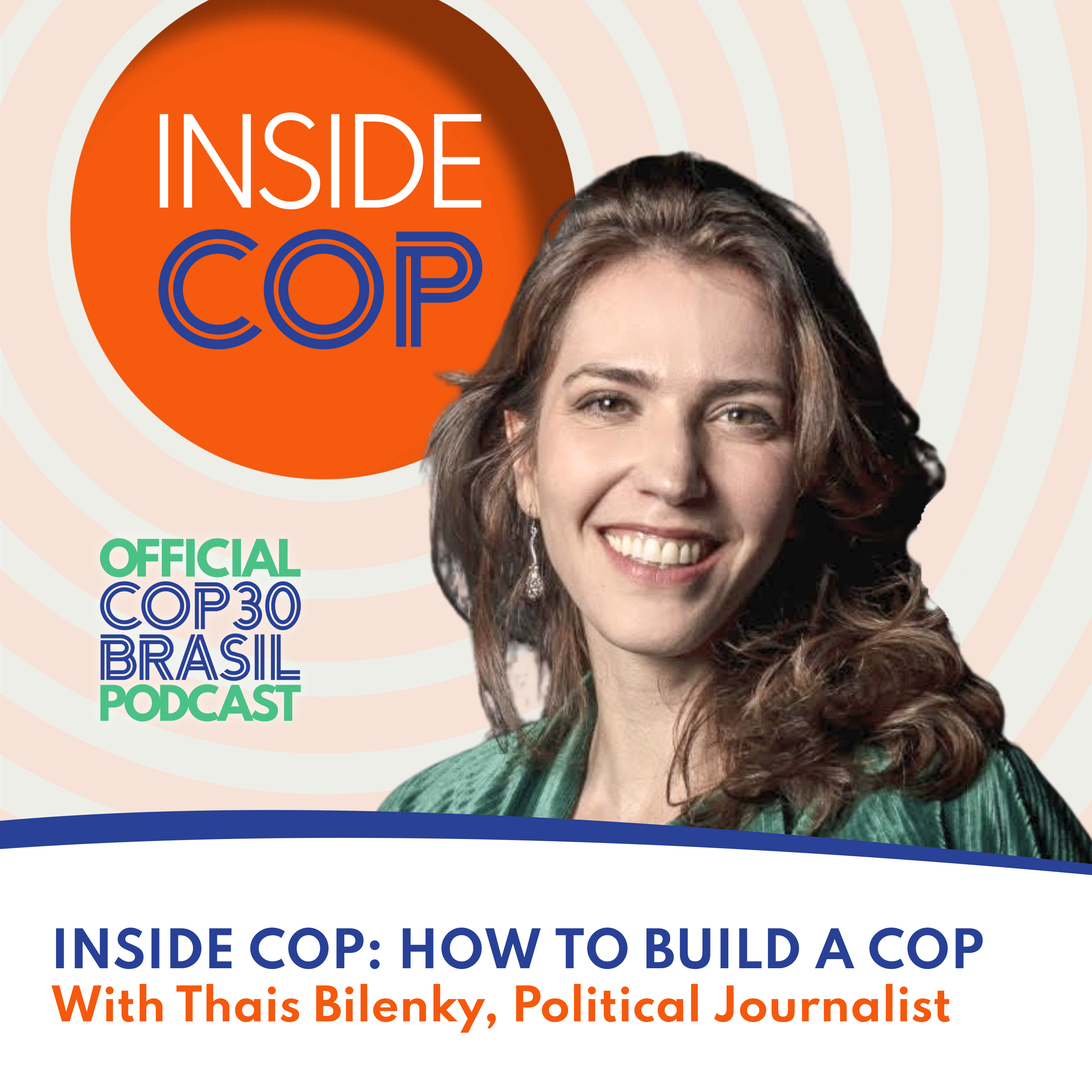
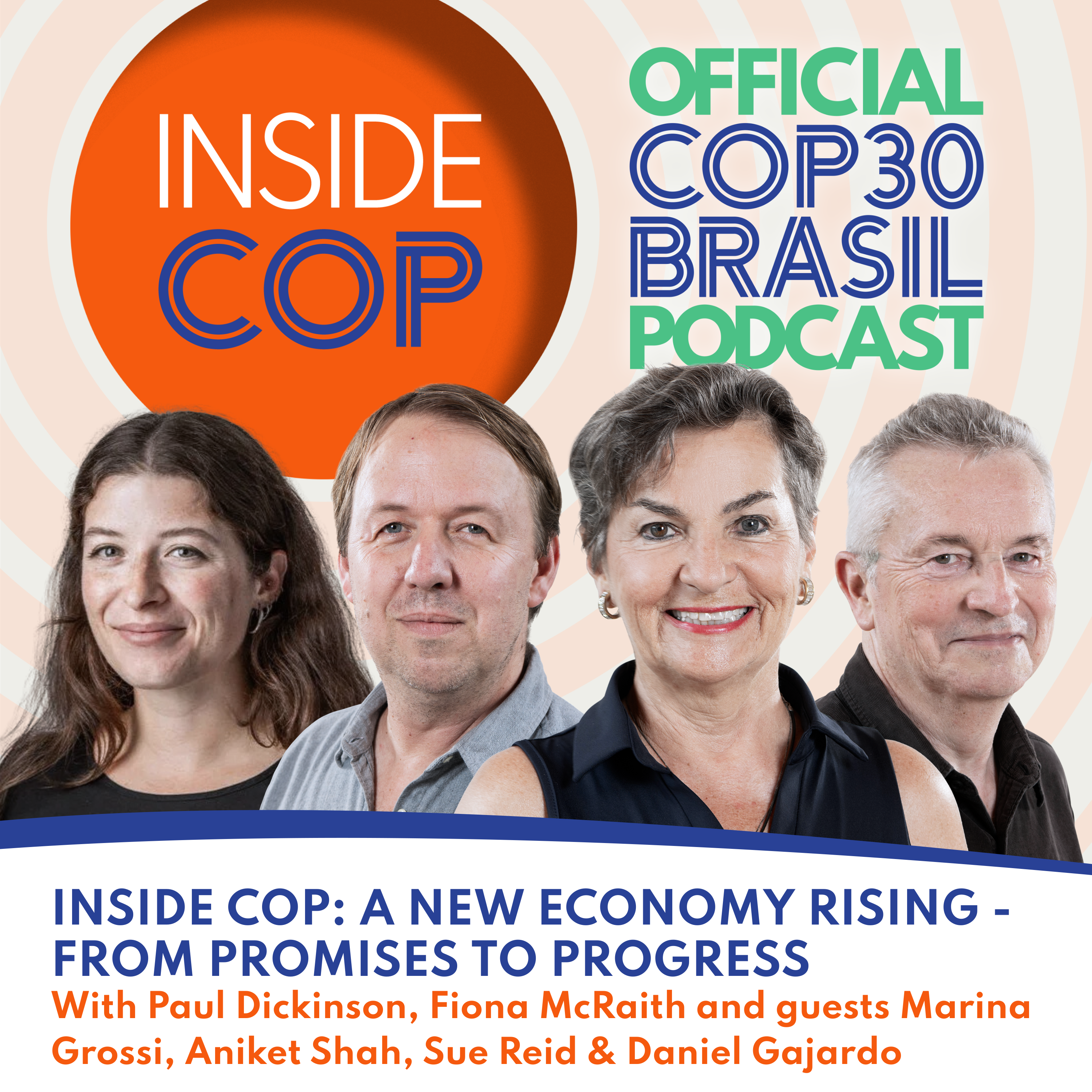
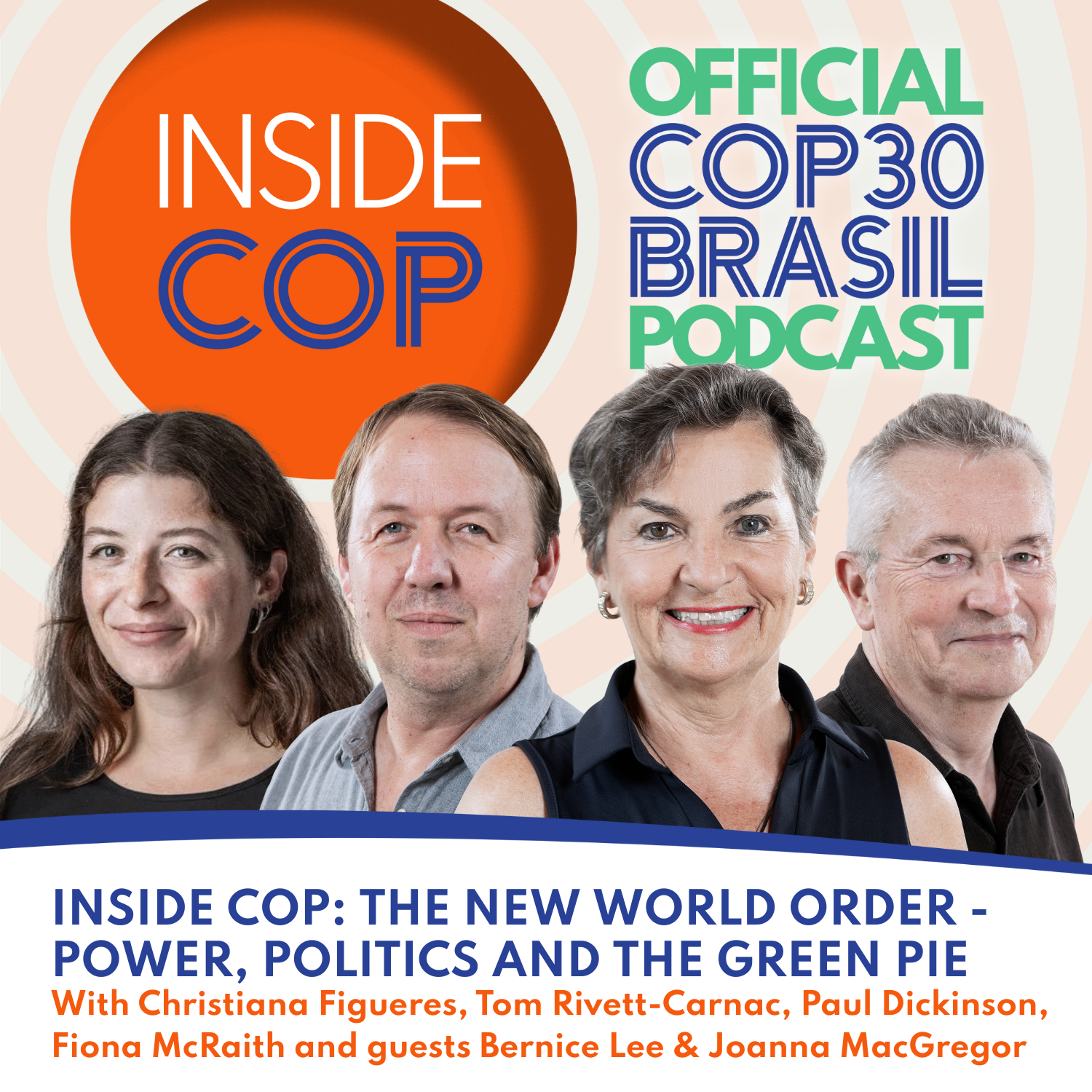
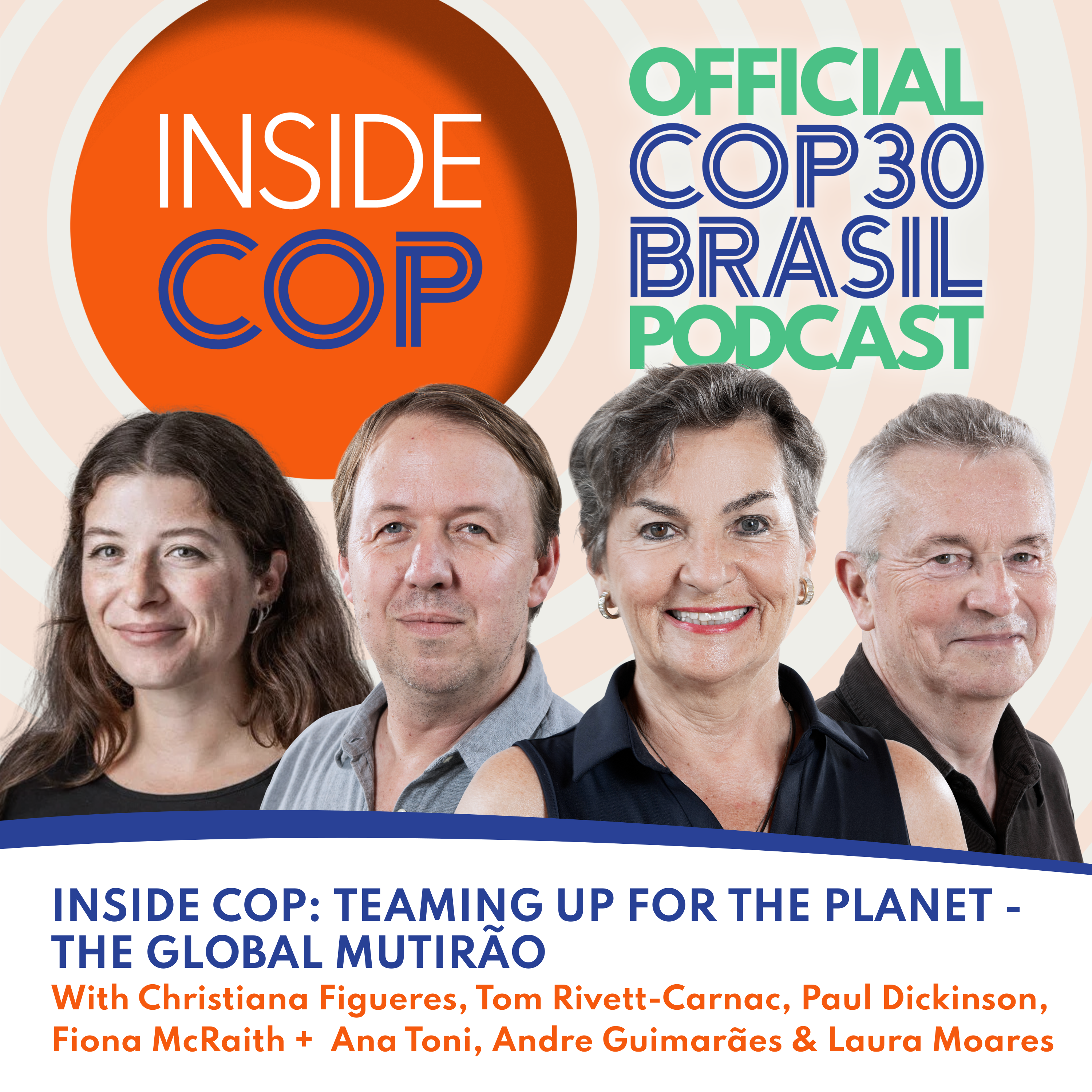
.png)
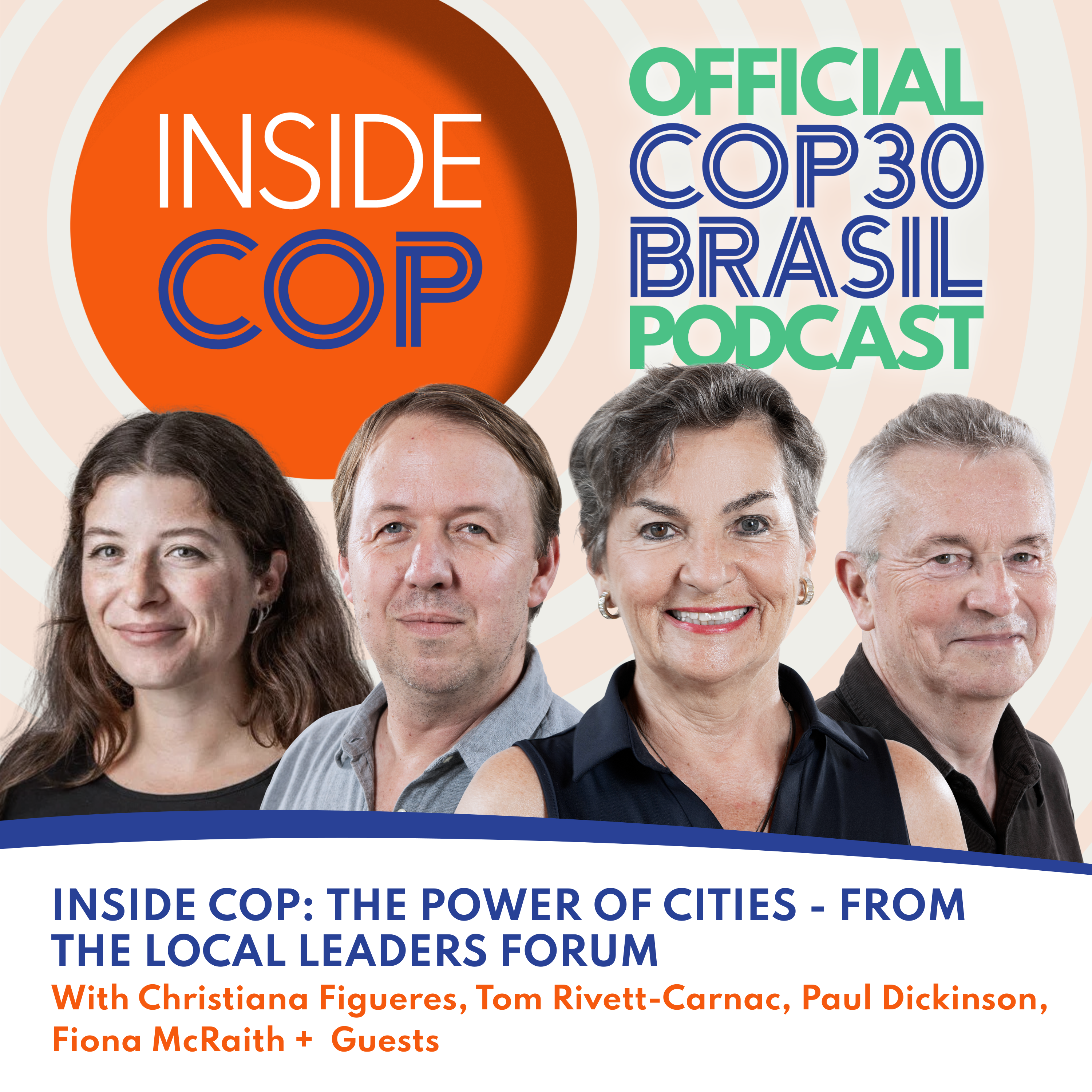
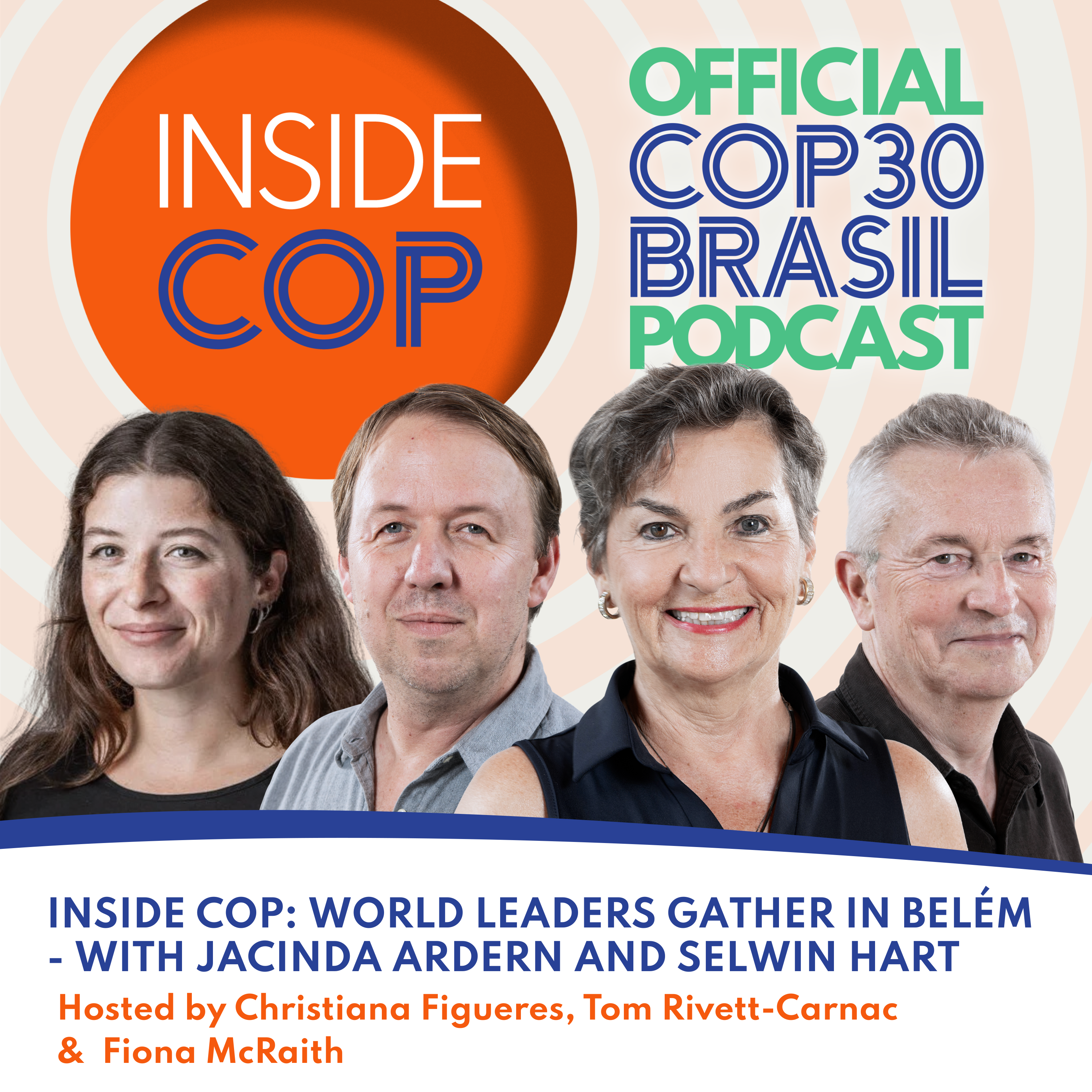
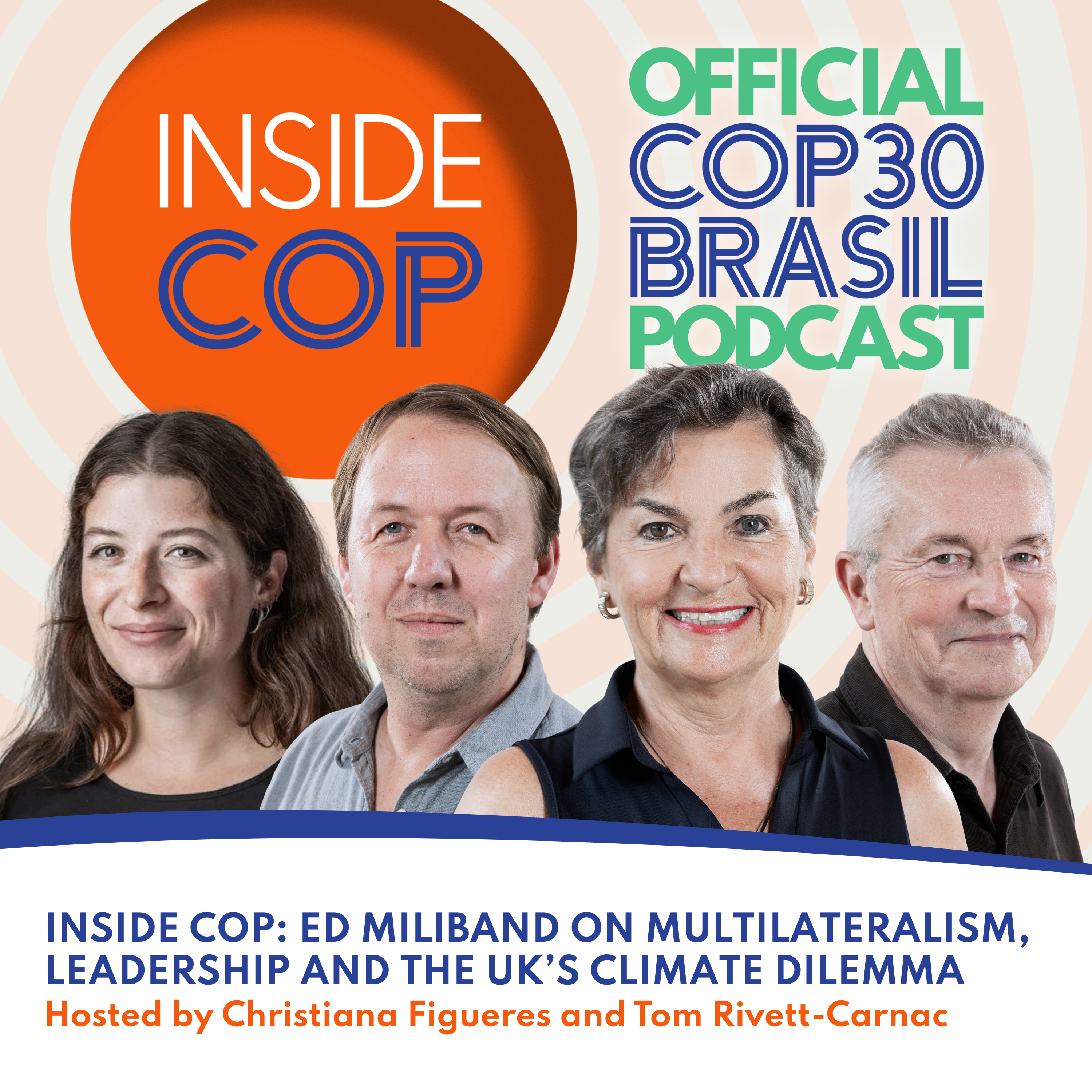
.png)
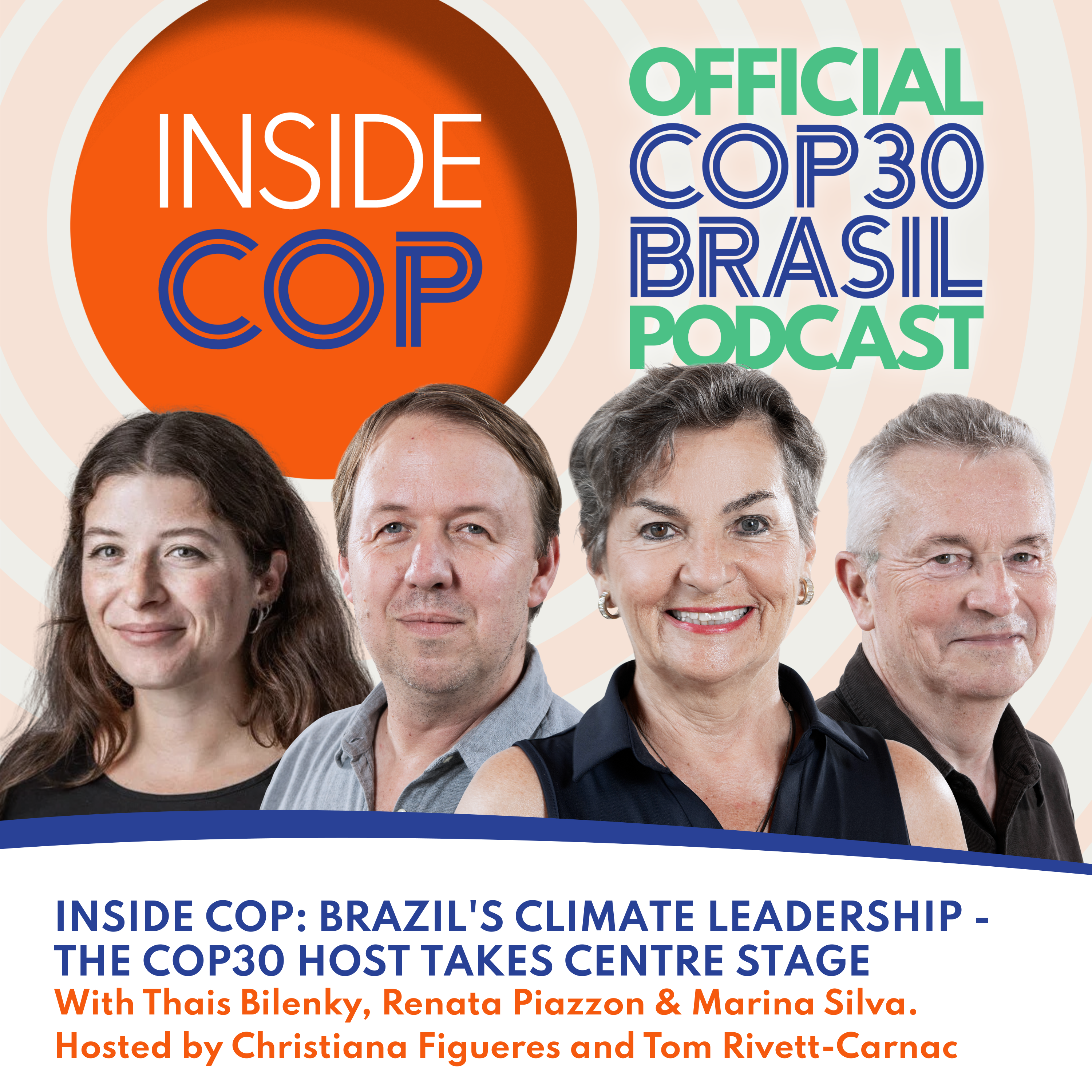
.png)
.png)
.png)
.png)
.png)
.png)
.png)
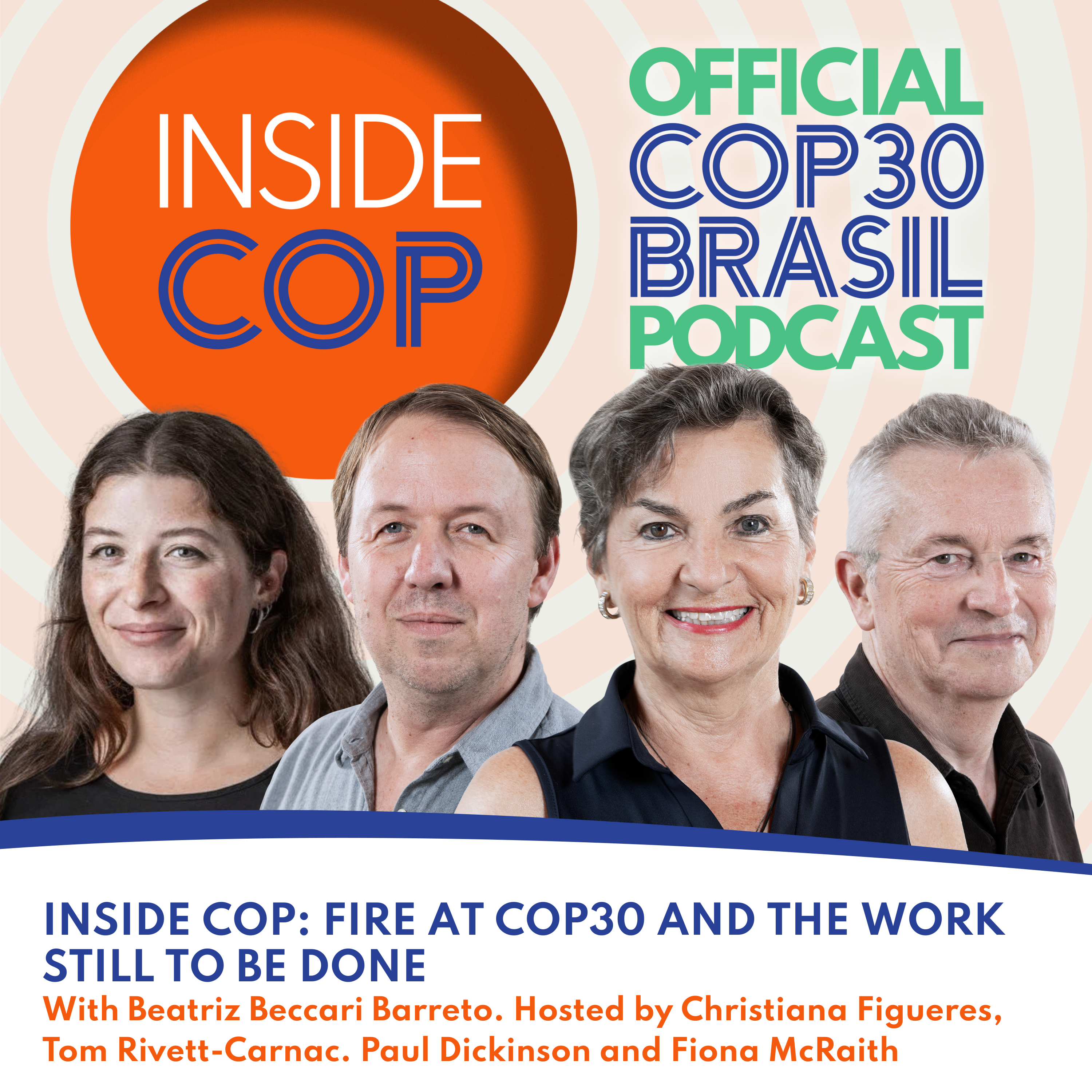

.png)
.png)






